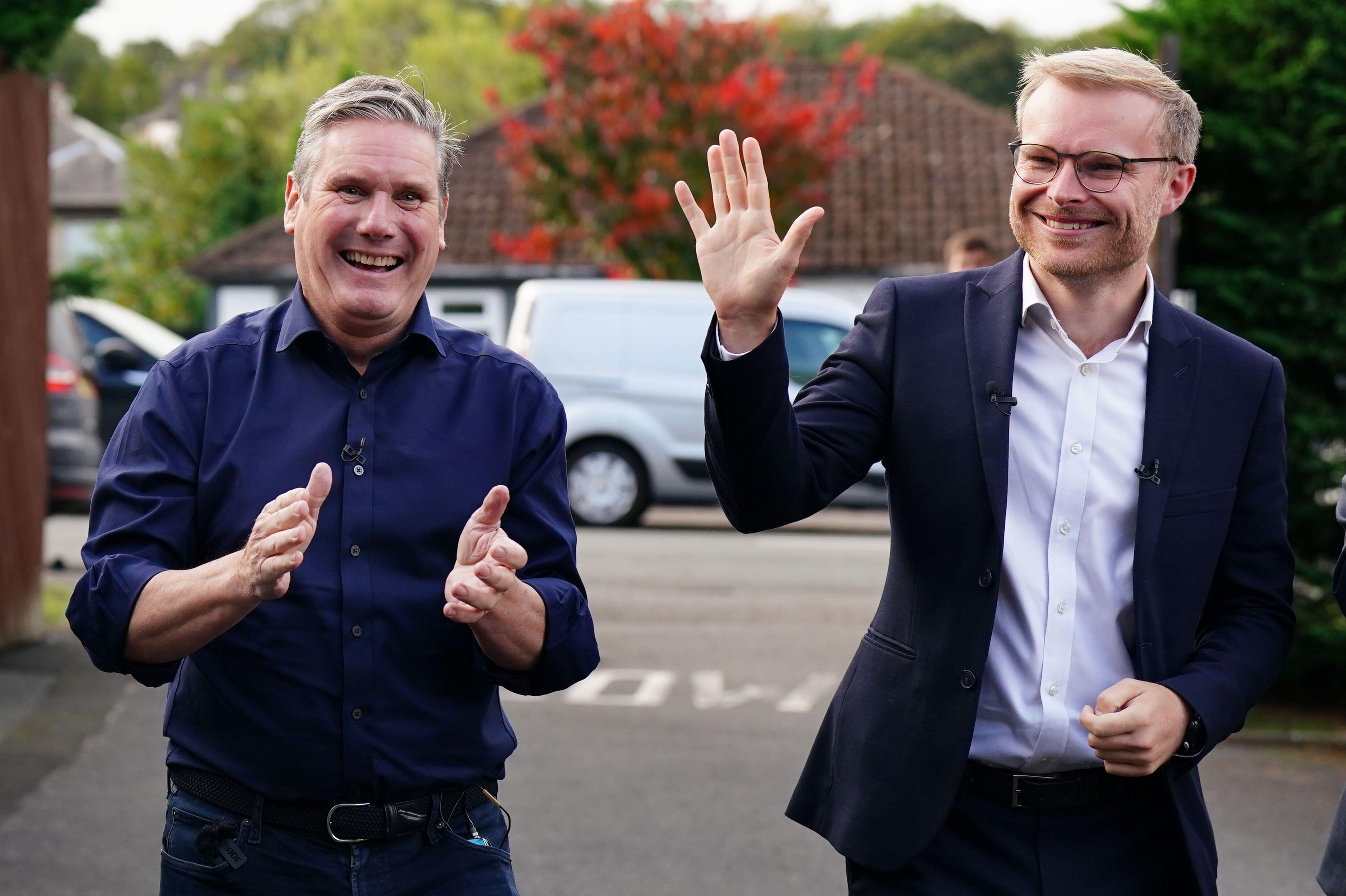Michael Shanks: The SNP needs to look up a dictionary for what austerity means
It’s a sunny September morning, 10 years to the day since the independence referendum, when I meet Michael Shanks at the UK Government’s offices in Edinburgh. For much of the past decade Shanks taught the referendum to his pupils at Park Mains High in Erskine before leaving behind his career as a modern studies teacher to take up a seat at Westminster last year. Shanks took back the Rutherglen and Hamilton West constituency from the SNP for Labour in a 2023 by-election which was to prove a bellwether for the general election 10 months later.
Now seated in an armchair in his temporary base of Scottish Secretary Ian Murray’s vast office in Queen Elizabeth House, Shanks laughs when I ask whether his years in the classroom and all that studying of recent political history has helped prepare him for life on the green benches.
“After lunch on a Thursday the kids would be just like a riot, and I’ve realised there are days in the House of Commons where that’s exactly the same,” he says. “Teaching prepares you for lots of things – it’s a great career. One of the things since becoming a minister is that I’m totally fine with putting my hand up and saying, ‘I don’t know anything about this, can you teach me?’”
And there’s a lot to learn. Following the election, Shanks became a junior minister in the Department for Energy Security and Net Zero (‘Desnez’ for short) under Ed Miliband. Within days of the vote it was reported that Miliband had ordered an immediate ban on new drilling in the North Sea, something which was later denied by the government. Shanks’ remit is vast, covering not only the energy transition but also reform of the energy market and the setting up of Great British Energy, the new state-run investment vehicle which Prime Minister Keir Starmer belatedly confirmed will be headquartered in Aberdeen weeks after the news had been leaked to the media.
But for all the new government’s attempts to appear as if it had hit the ground running, it was Chancellor Rachel Reeves’ decision to cut the winter fuel payment for millions of pensioners – a move opposed by trade unions and many Labour MPs – which has dominated the news agenda in the early months of Starmer’s premiership. Reeves said the decision, which will save the exchequer around £1.4bn this year, was necessary due to the parlous state of the finances inherited from the Conservatives. But it was an open goal for the SNP, who accused Labour of presiding over a new period of “austerity”.
“I think they [the SNP] need to look up a dictionary for what austerity means,” says Shanks. “So far, the Scottish Government has actually received more money out of UK Government decisions. They’re very good at talking about where their budget has been cut over the last few years; they’re not very good at recognising where it has increased. There is no austerity underway at the moment – we’ve made one significant budget decision around the winter fuel payment which so far has had absolutely no impact on the bottom line of the Scottish Government’s budget.”
I put it to Shanks that while it may not necessarily be the dictionary definition of austerity, cutting a winter fuel payment to millions of pensioners in the midst of a cost-of-living crisis certainly looks that way to members of the public.
“I don’t think it does, actually. The SNP are flailing around trying to find excuses for the fact they’re having to make incredibly tough decisions largely because of their own mismanagement. It was the Fraser of Allander Institute which said recently that actually most of the difficulty is because of decisions they made as a Scottish Government – they’ve got to face up to that. For 17 years we’ve been told it’s all Westminster’s fault – the public are absolutely fed up of it.”
Shanks is also critical of the SNP’s handling of ScotWind, the name given to the leasing of Scotland’s seabed for offshore wind. An initial auction of plots in 2022 raised £700m for the Scottish Government with energy giants including BP and Shell and Swedish state-owned Vattenfall behind some of the successful bids. Last month finance secretary Shona Robison said she would use £460m of the cash – previously earmarked for funding the energy transition – to help plug a gap in the government’s budget caused by public sector pay deals.
Shanks says the government in Edinburgh has “squandered” the opportunity presented by ScotWind.
“It’s a shame really. ScotWind has got enormous potential, and we really want it to succeed as it’s important for our energy objectives. I think it could have probably achieved more money than it got in the first place.
“But the second part of this is that the SNP challenged UK governments for generations on Scotland’s oil and what the legacy of that was. The legacy was that it was funding day-to-day services for 60 years. The [SNP] are now doing exactly the same within years of gaining that ScotWind inheritance. It’s a significant amount of money that can’t be found again to plug day-to-day spending. It’s a missed opportunity.”
Yet despite the tough talk, Shanks is keen to “reset” the relationship between the two governments at Westminster and Holyrood which had, let’s face it, completely deteriorated under Boris Johnson and Liz Truss and improved only marginally during Rishi Sunak’s time.
The most pressing challenge for that new spirit of collegiality is what happens to the oil refinery at Grangemouth after its owners, Petroineos, said it would close next year with the loss of 400 jobs. The refinery, which opened in 1924, is reported to be losing close to £400,000 a day and is on course to lose £153m in total this year.

Shanks at Westminster, photographed for Holyrood by Louise Haywood-Schiefer
“Grangemouth has been the biggest crisis we’ve had since we came into government,” says Shanks. “It’s the most important thing for [the two governments] to work together on and we have every single week. I have been meeting with [acting energy secretary] Gillian Martin or Ed Miliband has, and we’ve left the politics at the door. It’s been a really positive relationship, actually. We recognise we’re not going to agree on everything but fundamentally, particularly in areas of energy policy, we want the same thing – we want clean power, and we want to meet our climate change goals, so we have to work together.”
But if there’s a new spirit of togetherness when it comes to tackling the challenges of climate change then you’d be forgiven for having missed it. In the run-up to the election the SNP accused Labour of selling out the North Sea, claiming the party’s plans for an increased windfall tax on the profits of oil and gas companies would result in tens of thousands of job losses. One crass newspaper front page, seized upon by the SNP hierarchy, accused Miliband, Starmer, Reeves and Scottish Labour leader Anas Sarwar of being ‘traitors’. That after the SNP appeared to U-turn on its previous position of opposing the awarding of new drilling licenses in the North Sea.
With tax receipts from oil and gas still largely underpinning the Scottish economy, all eyes are on the chancellor ahead of her autumn statement at the end of this month. A recent report by energy consultants Wood Mackenzie said a hike in the energy profits levy, due to come into force in November, could cause “irreversible damage” to the sector and see production in the North Sea halve by 2030.
“We want to look at what comes beyond the energy profits levy,” says Shanks. “We’ve been really clear that this isn’t an unlimited tax, that there’s a limit to the windfall period. Ultimately, the decisions these companies are making are 10, 15, 20 years in the future. I recognise their concern but we’re doing everything we can to make the best possible environment for investment.
“My absolute commitment as a Scottish MP and an energy minister is to make sure the energy transition is organised and prosperous. We want to see a structured phase down of oil and gas and phase up of what comes next without a gap in the middle. There will not be a cliff edge to production. We said in our manifesto that there would be no new licenses to explore new fields but that does not cut off any of the licenses that are currently in operation or any of the potential consenting to new projects that are within existing license fields.
“Grangemouth does show the importance of being proactive on these things. We’ve been in government for two months, but we knew, frankly, that 10 years ago Grangemouth was on a shaky peg.”
Shanks’ boss recently told Energy UK’s conference that the government wanted to go faster on building the infrastructure needed for the energy transition by “taking on the blockers, the delayers, the obstructionists”. Miliband’s comments were interpreted as a war on nimbyism and presumably extend to those in Scotland currently objecting to proposals for 180ft high ‘super pylons’ across large swathes of the countryside.
Shanks says he would have no problem living next to a giant pylon and that the previous UK Government “buried its head in the sand” on the issue. He says that in the coming months, the government will launch a series of campaigns to make the case for improved energy infrastructure as a key “national mission”. That could go alongside money off bills or cash for local communities to help find consent for some of the projects, he adds.

Keir Starmer joins Shanks after his win in the Rutherglen by-election | Alamy
“I don’t think local people are nimbys,” he says. “There are nimbys – we absolutely know that, whether it’s [opposition to] building housing, building infrastructure. I think there are a lot of campaign groups who are against this infrastructure who are not actually based on local communities being involved. I’ve got a lot of correspondence from people saying there is a campaign group against a windfarm, for example, but they have never come to speak to us in the local community. There will still be a planning process – we’re not riding roughshod over it – but ultimately, we need to build some of this stuff.”
Before I leave, I ask how Shanks managed to teach the referendum to his modern studies pupils without giving the game away about his own politics.
“The best thing a pupil can say to you when you stop teaching them is that they had no idea what your politics are,” he says. “When I stood for election, I was still teaching and some of them would come in and say, ‘Sir, we had no idea you were Labour’. You want them to be excited and enthusiastic, but you want them to make their own minds up – that’s what it’s all about.”
Holyrood Newsletters
Holyrood provides comprehensive coverage of Scottish politics, offering award-winning reporting and analysis: Subscribe